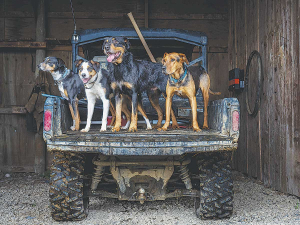NZ Catchment Groups Thrive with ‘Source to Sea’ Approach
The most successful catchment groups in NZ are those that have 'a source to sea' approach.
 Farm working dog is an amazing investment for a farmer - costing $500 to $1,000 but over a ten-year period it produces about $40,000 worth of labour. Photo Credit: Pam Stephen Photography.
Farm working dog is an amazing investment for a farmer - costing $500 to $1,000 but over a ten-year period it produces about $40,000 worth of labour. Photo Credit: Pam Stephen Photography.
Soon farmers and working dog breeders will be able to have a dog that best suits their needs thanks to a team of researchers at Massey University.
The team is half-way through a three-year programme to get some definitive science around the genetic makeup of our heading dogs and huntaways.
Dr Nick Sneddon is one of those involved in the project which is being funded by MPI through the Sustainable Food and Fibre Futures fund and with the support of state-owned farming entity, Pāmu. Sneddon has a personal interest in the project as his parents, who are dairy farmers in the South Waikato, also bred working dogs and he says this prompted him to become involved in the study.
He says if you think about sheep and cattle, a huge amount of scientific data is available about them, including all their specific genetic traits.
"But one of the most valuable assets on any farm is the working dog and we know little about their genetic traits. We don't really know what is in the background of Huntaways and heading dogs," he told Rural News.
"Wherever you go, you get a slightly different story about their genetic makeup and background and we don't know how much is hearsay and how much is true. This project is getting some hard data to prove or disprove the anecdotal information," he says.
Sneddon says the farm working dog is an amazing investment for a farmer. He says a dog may cost between $500 and $1,000 but over a ten-year period it produces about $40,000 worth of labour.
"That's a very good return on the investment," he says.
To that end, Seddon and the Massey research team have been supported by Pāmu as it gave them easy access to many working dogs in single locations. Two hundred of them have had their whole genome sequenced.
During their research, Sneddon says they have found some pretty cool things about the working dogs. He says they have been able to determine that there is little overlap in the genetics of heading dogs and Huntaways - they are separate breeds and by and large are purebreds. He says there are few mutations in the dogs, meaning that there a few signs of frequent genetic disease, currently these mutations are in between 2 to 8% of the dogs.
"What we have also been able to do is see if there are any mutations which may impinge on a dog's health such as hip dysplasia or myopathy which can cause muscle weakness over time, and also seeing if there are any neurodegenerative signs which could cause blindness and weakness," he says.
Sneddon says they are also working with a couple of vet clinics including VetLife to learn more about twisted gut - a particular problem with larger dogs.
Family Connection
Perhaps one of the most interesting and surprising elements of the project is that they are using Ancestry - commonly used by genealogists and others to trace their family history.
Nick Sneddon says Ancestry also has a 'pet' section and by using that tool they will be able to better compare phenotypes of up to 2,000 working dogs and see if there are any signs of other breeds in their history.
Compared with pet dogs, the working dog has some obvious and distinct traits - one of these being loyalty to the shepherd.
Sneddon says a pet dog will often wander away from its owner, whereas a working dog will stay close to their heel.
"But we are also looking at traits other than just genetic diseases, we are interested in if a dog can be left alone with sheep, or how easy it was to train," he says.
Sneddon says by the end of the three-year programme, they hope to have some good data that will benefit both farmers and breeders.
He says it's giving them hard data for breeding purposes so that farmers get a dog that best meets their needs.
Fruit trader Seeka posted a record profit and returns to shareholders in 2025.
Recent weather events in the Bay of Plenty, Gisborne/Tairawhiti, and Canterbury have been declared a medium-scale adverse event.
DairyNZ's chief executive Campbell Parker says the 2024/25 dairy season reinforces the importance of the dairy sector to New Zealand.
A New Zealand agribusiness helping to turn a long-standing animal welfare and waste issue into a high-value protein stream has won the Australian dairy sector's top innovator award.
OPINION: A bumper season all around.
Dairy Women's Network (DWN) has announced that Taranaki dairy farmer Nicola Bryant will join its Trust Board as an Associate Trustee.

OPINION: A mate of yours truly reckons rural Manawatu families are the latest to suffer under what he calls the…
OPINION: If old Winston Peters thinks building trade relations with new nations, such as India, isn't a necessary investment in…